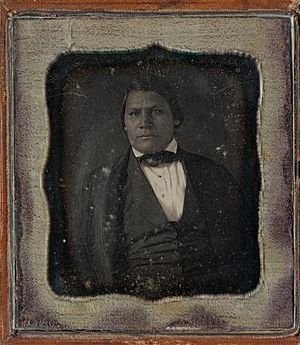Wa-o-wa-wa-na-onk facts for kids

Wa-o-wa-wa-na-onk was also known as Peter Wilson. He was an important leader and doctor from the Cayuga nation. He passed away in 1871. His Cayuga name, Wa-o-wa-wa-na-onk, means "They Heard His Voice" or "The Pacificator." This name shows how much people listened to him and how he helped bring peace. Peter Wilson was a strong voice for his people, working hard to protect their lands and rights.
Contents
Peter Wilson's Early Life and Education
Peter Wilson grew up on the Seneca Buffalo Reservation. He went to school there, taught by the Quakers. The Quakers were a religious group known for their peaceful ways and for helping others.
Becoming a Doctor
Peter Wilson was very smart and dedicated. In 1844, he achieved something amazing: he earned a medical degree from Geneva Medical College. This made him one of the very first Native Americans to become a doctor. After becoming a doctor, he also worked as an interpreter on the Cattaraugus Reservation. This meant he helped people who spoke different languages understand each other.
A Leader for His People
Some historical records suggest that Peter Wilson was a chief, or a "Grand Sachem." A Sachem is a respected leader among some Native American nations. Even if his official title was not always clear, he certainly acted as a powerful leader for the Cayuga people.
Fighting for Cayuga Land and Rights
Peter Wilson spent much of his life working to protect the lands of the Cayuga and Seneca nations. He faced many challenges, especially concerning land agreements.
Challenging Land Agreements
In 1838, a land agreement was signed that was not fair to the Cayuga people. Peter Wilson signed this agreement, possibly because he was seen as a chief. However, he soon realized it was wrong. He then worked with the Quakers to fix the situation. Together, they helped create a new, fairer agreement in 1842.
Speaking Out for Justice
Peter Wilson was not afraid to speak up for his people. In 1843, he wrote a letter to the Governor of New York State on behalf of the Cayuga. He explained their concerns about land. In 1846, he spoke to the New-York Historical Society in New York City. He talked about how the Iroquois people had lost their land unfairly and how they hoped to get it back.
Working with Lawmakers
He continued his efforts by asking the New York State Legislature for help. In 1853, he asked them to give the Cayuga people fair payment for the land they had lost. Even when the state did not provide the money, he kept pushing for their case in 1861.
Supporting Other Important Causes
Peter Wilson was a forward-thinking leader. He often spoke to different groups across New York. He wanted to gain allies who would support his cause to protect the homelands of both the Seneca and Cayuga people. He also strongly believed in women's suffrage. This means he urged groups to support the right for women to vote.
 | Frances Mary Albrier |
 | Whitney Young |
 | Muhammad Ali |

